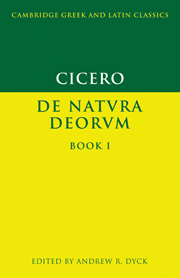Introduction
Published online by Cambridge University Press: 05 June 2012
Summary
EPICUREAN THEOLOGY
Epicurus' philosophy aimed to free the human being from fear of the gods and of punishment in the afterlife. He deployed atomic physics to eliminate divine causation from the world as well as the possibility that the soul could survive the death of the body. He might have been expected to deny the existence of the gods altogether, but this he declined to do in view of the widespread belief in their existence and in order to provide something that the gods of folkbelief had failed to yield, namely a model of blessedness for human beings to strive for, the happiness of his gods differing from that of the sage only in its infinite duration (and Epicurus was at pains to deny that duration had any important effect on pleasure). In the case of the gods, as in that of free will, Epicurus had to make certain adjustments to his physics in order to accommodate his ethical goals. In this case he exempted the gods from the law of decomposition and decay to which other atomic compounds are subject.
Epicurus dealt with theology in separate books entitled On gods and On piety, as well as in the twelfth book On nature (Epicurea pp. 103–4, 106–8, 127–8), all lost apart from small fragments, and To Menoeceus 123–4. Later Epicurean accounts are partially preserved on papyrus: Demetrius Laco On the form of god (c. 100 bc) as well as the works of C.'s contemporary Philodemus On piety and On gods.
- Type
- Chapter
- Information
- Cicero: De Natura Deorum Book I , pp. 1 - 20Publisher: Cambridge University PressPrint publication year: 2003



